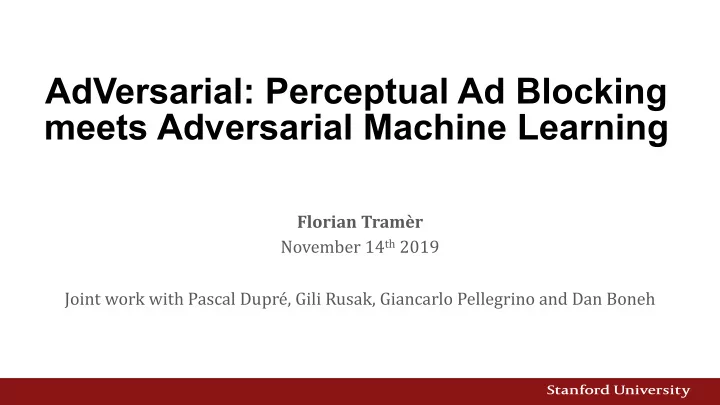

AdVersarial: Perceptual Ad Blocking meets Adversarial Machine Learning Florian Tramèr November 14 th 2019 Joint work with Pascal Dupré, Gili Rusak, Giancarlo Pellegrino and Dan Boneh
The Future of Ad-Blocking easylist.txt …markup… …URLs… ??? This is an ad Human distinguishability of ads > Legal requirement (U.S. FTC, EU E-Commerce) > Industry self-regulation on ad-disclosure 2
Towards Computer Vision for Ad-Blocking Why not detect ad-disclosures programmatically? New arms race on HTML obfuscation Exact image matching is not enough E.g., Facebook vs uBlockOrigin: https://github.com/uBlockOrigin/uAssets/issues/3367 >1 year, >275 comments , and counting... 3
Perceptual Ad-Blocking Ad Highlighter [Storey et al., 2017] § > Visually detects ad-disclosures > Traditional computer vision techniques > Similar techniques deployed in Adblock Plus Sentinel by Adblock Plus [Paraska, 2018] § > Locates ads in Facebook screenshots using neural networks Percival by Brave [Din et al., 2019] § > Neural network embedded in Chromium’s rendering pipeline 4
Perceptual Ad-Blocking Ad Highlighter by Storey et al. § > Visually detects ad-disclosures > Traditional Computer Vision techniques > Simplified version implementable in Adblock Plus Sentinel by Adblock Plus § > Locates ads in Facebook screenshots using neural networks > Not yet deployed 5
How Secure is Perceptual Ad-Blocking? … so that Tom’s post Jerry uploads gets blocked malicious content … 6
The Current State of ML ML works well on average ≠ ML works well on adversarial data 7
Adversarial Examples Szegedy et al., 2014 Goodfellow et al., 2015 𝜁 ≈ 2 255 ⁄ 8
What’s the Threat Model? (Eykholt et al. 2017) (Eykholt et al. 2018) 9
What’s the Threat Model? Is there an adversary? Are there no simpler attacks? Ø Misclassified clean examples? Ø Attacks that affect human perception too? White-box access to the model? Ø Or query access / access to training data? Unless the answer to all these questions is Yes , adversarial examples are likely not the most relevant threat 10
Adversarial Examples for Perceptual Ad-Blockers 11
Ad-Block Evasion Goal: Make ads unrecognizable by ad-blocker § Adversary = Website publisher § Other adversaries exist (e.g., Ad-Network) § 12
Evasion: Universal Transparent Overlay Web publisher perturbs every rendered pixel Use HTML tiling to minimize perturbation size (20 KB) Ø 100% success rate on 20 webpages not used to create the overlay Ø The attack is universal: the overlay is computed once and works for all (or most) websites Ø Attack can be made stealthier without relying on CSS 13
Ad-Block Detection Goal: Trigger ad-blocker on “honeypot” content § > Detect ad-blocking in client-side JavaScript or on server > Applicability of these attacks depends on ad-blocker type Adversary = Website publisher § > Use client-side JavaScript to detect DOM changes 14
Detection: Perturb fixed page layout Publisher adds honeypot in page-region with fixed layout > E.g., page header original With honeypot header 15
New Threats: Privilege Abuse Ad-block evasion & detection is a well-known arms race. But there’s more! … so that Tom’s post gets blocked Jerry uploads malicious content … What happened? Object detector model generates box predictions from full page inputs Ø Content from one user can affect predictions anywhere on page Ø Model’s segmentation is not aligned with web-security boundaries Ø 16
Defense Strategies Obfuscate the ad-blocker? § Randomize the ad-blocker? § Pro-actively retrain the model? (Adversarial training) § 17
The Most Challenging Threat Model for ML Ø Adversary has white-box access to ad-blocker Ø Adversary can exploit False Negatives and False Positives in classification pipeline The ad-blocker must defend Ø Adversary prepares attacks offline ó against attacks in real-time in the user’s browser Ø Adversary can take part in crowd-sourced data collection for training the ad-blocker 18
Take Away Emulating human detection of ads could be the end-game for ad-blockers § > But very hard (impossible?) with current computer vision techniques Perceptual ad-blockers must survive an extremely strong threat model § > This threat model perfectly aligns with white-box adversarial examples > Will we soon see adversarial examples used by real-world adversaries? More in the paper § > Unified architecture + attacks for all perceptual ad-blocker designs > Similar attacks for non-Web ad-blockers (e.g., Adblock Radio) Train a page-based ad-blocker Ø Download pre-trained models Ø Attack demos Ø 19
Research Impact 20
How does a Perceptual Ad-Blocker Work? Ad Disclosure https://www.example.com Ad Classifier Classifier Data Collection and Training Classification Action Page Segmentation Template matching, OCR, DNNs, Object detector networks Ø Element-based (e.g., find all <img> tags) [Storey et al. 2017] Ø Frame-based (segment rendered webpage into “frames” as in Percival) Ø Page-based (unsegmented screenshots à-la-Sentinel) 21
Building a Page-Based Ad-Blocker We trained a neural network to detect ads on news websites from all G20 nations Video taken from 5 websites not used during training 22
Defense Strategies Obfuscate the ad-blocker? § > It isn’t hard to create adversarial examples for black-box classifiers Randomize the ad-blocker? § > Adversarial examples robust to random transformations / multiple models Pro-actively retrain the model? (Adversarial training) § > New arms-race: The adversary finds new attacks and ad-blocker re-trains > Mounting a new attack is much easier than updating the model > On-going research: so far the adversary always wins! 23
Recommend
More recommend